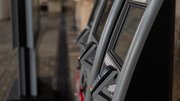Article
Greening self-service: Eco-friendly manufacturing
This is the second article in a two-part series examining the self-service industry's efforts to help consumers — and itself — make a lighter environmental impact on the planet.

August 1, 2010 by Missy Baxter — journalist, Baxter Publishing
As the emerging "green" solutions market expands, consumers are quickly realizing that technology can make it easier — and in some cases more rewarding — to reduce, reuse and recycle.
Along with introducing eco-friendly technology such as kiosks to rent bikes and recycle mobile phones, the self-service industry is working to boost its own internal sustainability in all sectors. From research and development to manufacturing and service, eco-friendly changes are underway. Best practices being implemented include policies to reduce energy usage, recycle hardware, refurbish components and rely on local sources when possible.
Engineers are designing more efficient machines. Manufacturers are utilizing recyclable enclosure materials. Service vendors are refurbishing components.
For example, KIOSK Information Systems, which is paving new territory in the "green" solutions market, is rolling out solar-powered kiosks built from readily recyclable enclosure materials, using eco-friendly paint processes.
Other global players are also leading the way in environmental stewardship. For instance, NCR Corp. is a member of theU.S. Environmental Protection Agency's Climate Leaders program, an industry-government partnership striving to develop comprehensive climate change strategies. As a program participant, NCR has agreed to undertake several significant efforts:
- Conduct a corporate-wide inventory of greenhouse gas emissions based on a quality management system.
- Set aggressive reduction goals that can be accurately measured to determine impact.
- Report progress yearly to the Environmental Protection Agency (EPA).
 
"Environmental stewardship will be a passion for us over the next decade," NCR Chairman and CEO Bill Nuti said in a press release announcing the company's participation in the EPA program. "As a leader in helping consumers connect, interact and transact with businesses the world over, we understand the importance of making a commitment to corporate social responsibility and how every act can truly make a difference."
Transforming the way people and businesses use technology could reduce annual man-made global emissions by 15 percent in a decade, according toSMART 2020, a comprehensive global study published by the Climate Group, a nonprofit think tank.
To help counter the increasing amount of electronic waste in society, many manufacturers and deployers have tightened the ropes on disposal practices. Instead of hauling old machines to landfills, industry leaders are opting to recycle, recover and refurbish when possible. In addition, companies are closely monitoring compliance to legislative requirements such as the European Union Directive on Waste Electrical and Electronic Equipment (WEEE), which regulates disposal of kiosks in Europe.
For instance, NCR officials say, the company's end-of-life hardware management services are designed to ensure safe, environmentally-responsible product decommissioning, recycling, treatment and disposal.
Industry leader Coinstar also is making great strides. Over the past two years, Coinstar has recycled more than 720,000 pounds of scrap metal as machines and parts are retired from service. The company is also saving an estimated 10,000 gallons of fuel annually during delivery and service calls by installing GPS, monitoring vehicle idle times and properly maintaining vehicles. In addition, Coinstar is adding gasoline-electric hybrids to the fleet.
The company is also conserving energy, fuel and other natural resources from the manufacturing plant to the break room, where employees recycle paper, cans and plastic.
Diebold Inc. also launched an environmental stewardship program last year. The aim is to help financial customers improve how they discard or reuse hardware such as ATMs. Since the machines often contain lead, mercury and cadmium, proper disposal helps prevent toxic chemicals from entering the environment. That's another major step toward reducing the self-service industry's carbon footprint.
Old machines and electronic components are being recycled and refurbished by an increasing number of deployers, parts suppliers and service vendors. In coming years, the market for used and refurbished kiosks and components is expected to soar, spurred by economic and environmental concerns.
"When used parts are properly and fully refurbished, they are often the best option, both economically and environmentally," said Mike Weinhart ofATM Components & Technology, which provides parts, service and training for ATM networks around the world. "For clients, consumers and the self-service industry, it's definitely a win-win situation when we can reuse materials and make the best use of our resources."
Included In This Story
KIOSK Information Systems
KIOSK Information Systems is a world leader in self-service solutions because of its long history delivering proven expertise in design engineering and manufacturing, application development, integration, and comprehensive support services.
Request Info
Learn MoreDIEBOLD NIXDORF
As a global technology leader and innovative services provider, Diebold Nixdorf delivers the solutions that enable financial institutions and retailers to improve efficiencies, protect assets and better serve consumers.
Request Info
Learn More ChatGPT
ChatGPT Grok
Grok Perplexity
Perplexity Claude
Claude











